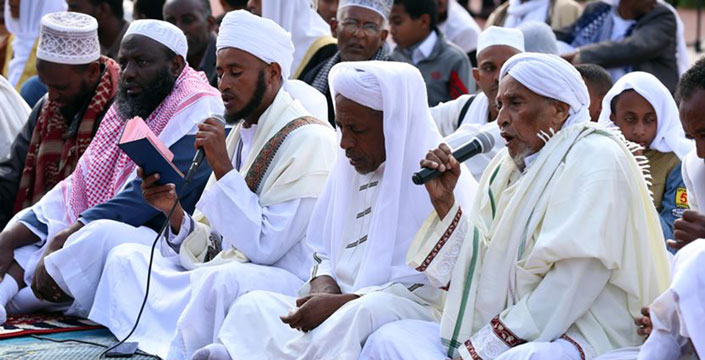Mawlid al-Nabi (The Birth of Prophet Muhammad)
Overview:
Date of Celebration: Mawlid al-Nabi is celebrated on the 12th day of Rabi' al-Awwal, the third month of the Islamic lunar calendar. The exact date is debated, as some traditions place the birth on different days of Rabi' al-Awwal, but the 12th is the most widely observed. Like other Islamic holidays, the exact timing varies based on the sighting of the moon.
Significance: Mawlid al-Nabi marks the birth of Prophet Muhammad, the last prophet in Islam. The day is dedicated to honoring his life, teachings, and the profound influence he had on the world. It is a time to reflect on the message of Islam, the compassion, mercy, and guidance brought by the Prophet, and the lasting impact of his leadership and wisdom.

Historical Context:
The Birth of Prophet Muhammad: Prophet Muhammad was born in the city of Mecca in 570 CE. He is considered the final messenger of Allah (God) in Islam, bringing the Quran and the teachings of Islam to humanity. His life and actions, as recorded in the Hadiths, serve as the primary source of guidance for Muslims.
The Role of Prophet Muhammad: The Prophet is seen as a model for all Muslims to emulate in their daily lives. His qualities of kindness, justice, patience, and compassion are revered and celebrated. Mawlid al-Nabi is an occasion to reflect on these virtues and renew one’s commitment to following his example.
Cultural and Religious Practices:
- Recitation of Poetry and Songs (Qasidas):
One of the most prominent practices during Mawlid al-Nabi is the recitation of poetry and songs that honor the Prophet Muhammad. Qasidas—poems written in his praise—are commonly recited in mosques, community centers, and public gatherings. These recitations recount his noble qualities, his mission as the Messenger of Allah, and his spiritual significance. They are often performed by singers or choirs, creating an atmosphere of deep devotion and celebration.
- Public Gatherings and Sermons:
Mawlid al-Nabi is marked by large public gatherings and sermons (khutbahs) in mosques and community centers. Religious leaders and scholars deliver sermons that discuss the life and teachings of the Prophet Muhammad, highlighting his role as a spiritual leader and moral exemplar. These sermons encourage the audience to reflect on his ethical teachings, such as kindness, forgiveness, and the importance of helping the poor.
- Feasting and Social Gatherings:
As with many Islamic festivals, Mawlid al-Nabi is a time for communal gatherings and festive meals. Families and friends come together to share traditional dishes and sweets. In various cultures, special foods such as ma'amoul, baklava, and knafeh are prepared to mark the occasion. The act of sharing food reinforces the values of generosity and community that are central to the celebration.
- Lighting and Decoration:
In many Muslim communities, homes, mosques, and public spaces are decorated with lights, lanterns, and banners bearing Islamic motifs and the name of the Prophet Muhammad. These decorations symbolize the light of divine guidance that the Prophet brought to the world. In some regions, public processions or parades take place, where participants sing songs of praise and display banners honoring the Prophet, further enhancing the festive atmosphere.
- Charity and Acts of Kindness:
On Mawlid al-Nabi, Muslims are encouraged to engage in acts of charity and kindness, following the example of the Prophet Muhammad. Many donate to charitable organizations, provide meals to the poor, or give gifts to those in need. This practice embodies the mercy and compassion that the Prophet exemplified during his life.
- Recitation of the Quran and Prayers:
Extra prayers and recitations of the Quran are an essential part of Mawlid al-Nabi. Many Muslims use this occasion to read the entire Quran or focus on passages that celebrate the life and virtues of the Prophet. Additionally, blessings (Salawat) are recited throughout the day, invoking peace and blessings upon the Prophet Muhammad, in keeping with Islamic tradition.
- Visiting Mosques and Shrines:
In regions where significant Islamic shrines or mosques dedicated to the Prophet's companions are located, believers may visit these sacred sites to offer prayers and pay their respects. Such visits provide an opportunity for reflection and help to deepen their connection with the historical roots of their faith.
Significance for Muslims:
Mawlid al-Nabi is a time to reflect on the life and exemplary character of Prophet Muhammad. It serves as a reminder for Muslims to emulate his teachings of mercy, honesty, justice, humility, and compassion.
The celebration of his birth strengthens the sense of unity within the Ummah (the global Muslim community) and encourages believers to renew their commitment to the values laid out in the Quran and Hadith.
It also provides a moment to express gratitude for the guidance and wisdom that the Prophet provided and to reflect on how his legacy can inspire a more compassionate and righteous way of life.
Conclusion:
Mawlid al-Nabi is one of the most cherished celebrations in the Islamic world.
It is a day dedicated to honoring the birth and legacy of Prophet Muhammad through a variety of spiritual and communal practices, including recitations, sermons, feasting, decoration, and charitable acts.
By celebrating his life and teachings, Muslims not only reaffirm their commitment to the core values of Islam but also foster a strong sense of community, spiritual renewal, and gratitude for the guidance that continues to shape their lives.